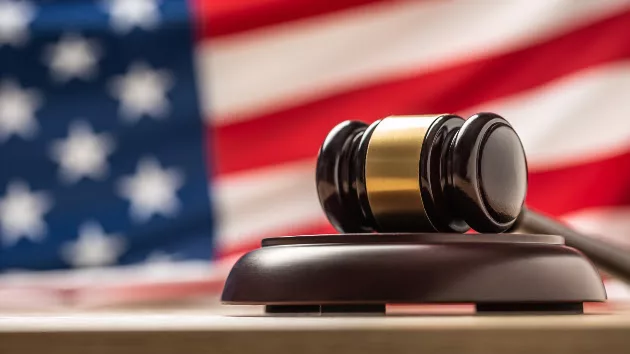(DENVER) — The Colorado Supreme Court heard oral arguments Wednesday in the historic challenge to Trump’s ballot eligibility in Colorado under Section 3 of the 14th Amendment.
During the two-hour hearing in Denver, the seven-justice court posed sharp questions central to the case, including on the definition of insurrection; whether the Capitol riot that occurred on Jan. 6, 2021 was an insurrection; and whether the “insurrectionist ban” applies to a U.S. president.
It is unclear when Colorado’s Supreme Court will issue a ruling.
A Colorado district court decided on Nov. 17 that Trump should appear on the state’s Republican primary ballot despite finding that he engaged in an insurrection in the attack on the U.S. Capitol on Jan. 6, 2021.
In doing so, District Court Judge Sarah B. Wallace ruled against a group of six Republican and unaffiliated voters in Colorado, represented by the watchdog group Citizens for Responsibility and Ethics in Washington (CREW).
CREW filed a lawsuit in September that sought to bar Trump from the state’s Republican primary ballot under the amendment’s “insurrectionist ban” clause, which disqualifies people from running for office if they’ve engaged in “insurrection or rebellion” against the U.S. The plaintiffs argue Trump’s activity around Jan. 6 was covered by that clause.
But Wallace also issued a historic set of findings, including the first legal ruling that the former president had incited insurrection through his actions on Jan. 6. It was also the first time a court has found a presidential candidate had engaged in insurrection.
Both CREW’s legal team and Trump’s lawyers appealed Wallace’s ruling and findings to the Colorado Supreme Court: CREW, because of the final decision on Trump’s ballot eligibility, and Trump’s team over the judge’s opinion that the former president engaged in insurrection.
The petitioners made the the case on Wednesday that Section 3 of the 14th Amendment was one of the most important guardrails for safeguarding American democracy.
“Our Constitution, as we talked about, it’s just a document. It’s a promise to each other that we must enforce to protect our shared democracy. The rule of law comes with real fragility, because our Constitution commands no armies, has no police force. All it has is very limited self-defense mechanisms that my colleague mentioned, and that is Section Three,” said CREW lawyer Eric Olson.
CREW’s legal team also pushed back on the Trump team’s claims that it would be anti-democratic to disqualify a leading presidential candidate from 2024 ballots.
“Trump’s argument that because he’s popular, that should affect how we interpret Section Three here could not be more dangerous. Jefferson Davis would have gotten a lot of popular support right after the Civil War. And the application of Section Three is at its most urgent when a person who has desecrated their oath to the Constitution already seeks to become our commander in chief again, if we say that this conduct by this person is not enough under the Constitution, what we do is empower Trump and others to use more political violence to attack our democracy,” Olson added.
But the plaintiffs also fielded difficult questions from the seven justices, including inquires about the lower court’s embrace of the definition of insurrection — a definition that the district court found Trump as having been covered by when she wrote that he engaged in the act.
“I guess I’m expressing a concern about the definition of insurrection that the District Court adopted, it strikes me as somewhat or potentially broad– so let me ask you to address that,” Chief Justice Brian D. Boatright asked.
The justices also posed pointed questions to Trump’s lawyer Scott Gessler, including inquiries into the definition of insurrection and if the president is considered an “officer of the United States.”
Gessler also said the definition of insurrection as adopted by the district court was far too broad.
“What if we narrowed it to say prevent the peaceful transfer of power of the United States government? Would that be an insurrection — to prevent the peaceful transfer?” asked Justice Richard L. Gabriel.
“I don’t think so,” responded Gessler.
Ahead of oral arguments on Wednesday, amicus briefs supporting the petitioners have been filed by experts, including Professors Martha Minow, Erwin Chemerinsky and Carol Anderson and former Colorado Secretary of State Mary Estill Buchanan on topics including the history of the amendment’s Section 3, the president as an “officer” under Section 3 and arguing the inapplicability of a First Amendment defense for inciting insurrection.
For Trump, a number of experts filed amicus briefs, along with a group of 19 attorneys general from GOP-controlled states led by Indiana AG Todd Rokita and West Virginia AG Patrick Morrisey who urged the court to take note of the rejection of similar legal challenges in Minnesota and Michigan and to reject the petitioners’ lawsuit.
Republican secretaries of state in Ohio, Missouri and Wyoming filed a brief that argues Trump was “wrongfully” accused of engaging in an insurrection. The secretaries of state argue the ruling “sets an unfair and dangerous legal precedent that could potentially impact election administration in other states.”
A group of 14 state Republican parties, led by the Kansas Republican Party, and the Republican National Committee, also filed briefs in support of Trump.
Dozens of lawsuits arguing Trump should be disqualified from running for president in 2024 under Section 3 have been filed in states across the nation. All have failed in court thus far, including in Minnesota, where the challenge was heard by the state’s Supreme Court.
The case in Colorado could be an outlier, however, as all seven justices on Colorado’s Supreme Court were appointed by Democratic governors. Both CREW’s lawyers and Trump’s legal team have said they may appeal to the U.S. Supreme Court, depending on the outcome of this case.
Copyright © 2023, ABC Audio. All rights reserved.





